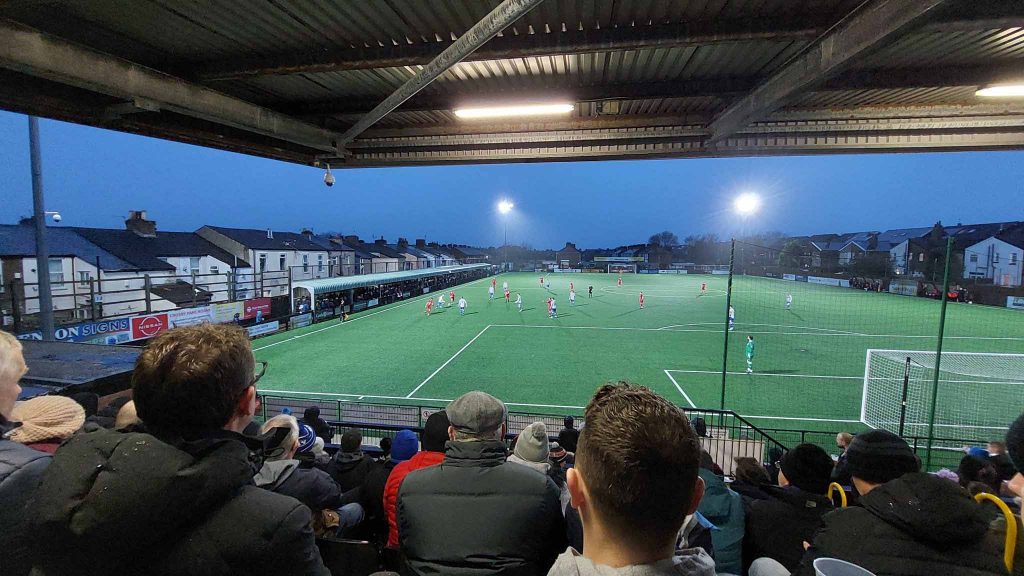British football fans have become increasingly dissatisfied with the way clubs are being run, how decisions about the club are made and the expense of ticket prices. What can they learn from Germany’s fan-owned clubs?
Graeme Keiths has been supporting AFC Liverpool for over 30 years. Unlike its Premier League namesake, his club in a fan-owned outfit where supporters make decisions about the club and xxx. So it’s no surprise to find Graeme on the terraces cleaning up after last night’s game.
“I want to contribute to the club and that means being part of the team who clean up, write programmes and hand out the tickets…”
However, In a highly commercialised sporting environment, clubs that rely on member ownership may be at a financial and market competitiveness disadvantage. They may have difficulty paying high salaries to attract top players compared to clubs that receive external capital investment, according to Graeme.
“It’s pretty clear that member-owned clubs face significant financial challenges compared to the privately owned giants,” said Graeme, a fan of AFC Liverpool,” Look at the top of the Premier League; clubs like Manchester City and Chelsea have immense financial backing from their wealthy owners.”
“Without money, you can’t buy better players, you can’t even upgrade the team’s training facilities, and you can’t even recruit youth players,” said Graeme.

A.F.C Liverpool was formed in 2008 by 1,000 supporters of Liverpool Football Club, a not-for-profit organisation; it is run on a one-member, one-vote system.
“The original intention of these 1,000 supporters was that they were looking for an alternative to the growing commercialisation,” said Graeme.
The official website of AFC Liverpool Football Club promotes their philosophy of implementing a one-person-one-vote system to ensure that all major decisions are made democratically by club members. This model is deeply rooted in the cooperative movement and emphasises community control of business interests.
“Honestly, the idea of shifting away from member ownership doesn’t sit well with me at all. It’s like we’d be losing the soul of the club,” said Graeme, “You know Arsenal, since the Americans took over, it feels more like a cash machine than a football club. The price of season tickets is ridiculous.”
Christoph Biermann, a veteran German football journalist, said,” In German football, we have this ’50+1 rule’ that’s really interesting. It’s a way to keep clubs from just becoming businesses run by the highest bidder. What it means is that the fans, or the club members, hold the majority of voting rights. So, they have over 50% of the control plus one share. This stops any outside investor from taking over completely.”
“It keeps the clubs connected to their roots—their fans and communities. This is really important because it means decisions are made for the fans, not just for profit. Even though it might limit some big-money investments, it also keeps the club’s identity intact, and I think that’s crucial.” said Christoph.
Christoph Biermann says that although there are some similarities between the structure of AFC Liverpool and the German 50+1 rule, there are also key differences. The 50+1 rule stipulates that German football clubs must retain majority control through their members, ensuring that external investors cannot take complete control of the club.
However, the German model still allows for a lot of external investment, while AFC Liverpool, due to its grassroots nature and smaller financial base, has placed more restrictions on external investment.
Since 1998, the 50+1 rule has been incorporated into German regulations to prevent investors such as millionaires and multinationals from taking over full control of clubs. The rule states that the registered association and its members must have a majority of the voting rights of the football club.
The German Football Association (“DFB”) has stated that clubs will not be allowed to play in the Bundesliga if they breach this rule.

But 50+1 has not gone unchallenged, and in the most recent crisis stemming from the period of the Covid-19 epidemic.
“The virus has led to a sharp drop in revenue for several Bundesliga clubs. With no spectators in the stadiums for months, clubs were unable to spend a large part of their income during that time,” said Christoph,” There is much debate about the merits of the 50+1 rule and whether it is better for private investors to pump millions of euros into clubs and provide them with protection in times of crisis.”
The turnaround in this debate in that year came from the coach Hans Flick leads Bayern Munich to Champions League victory.
Anshul Ramesh from Lex Sportiva, addressed key reasons for Frick’s success; all key management and administrative positions at Bayern are headed by themselves. From Uli Hoeneß to Karl Rummenigge to Miroslav Klose, they are all former Bayern players, which helps the whole Bayern unit to function properly. This is because of the 50+1 rule. The level of trust and rapport with their own players is commendable due to the involvement of the fans in decision-making.
Unlike many English Premier League clubs, who employ managers or have owners who have no connection to the club, the 50+1 rule ensures that the fans themselves have the responsibility to lean on their idols. They also allow for more trust to be placed in the chairmen, presidents and other positions with the belief that they know the fans best and represent their needs and ideas.
According to Deutsche Wallette, the “50+1” rule in Germany continues to be a strong pillar in maintaining fan-centric club management and financial stability in the Bundesliga despite facing significant scrutiny and legal challenges.
As former UEFA president Michel Platini amply emphasised at the 41st DFB meeting, the 50+1 rule ensures financial stability: “While the rest of Europe has boring leagues, half-empty stadiums and clubs on the verge of bankruptcy, German football is in excellent health.”
So could this German 50+1 system be replicated at all levels of football in the UK?

“There are differences in football culture and management in the UK and Germany. Most clubs in the UK are privately or corporately owned, unlike the German model, which emphasises community and member involvement…,” said Christoph.
“Promoting the “50+1” rule would require changes to existing laws and sports governance structures, which may require a complex legislative process and extensive stakeholder consultations.”
According to Deloitte, the Premier League is the most lucrative of the five leagues, generating £6.1bn in revenue in the 22/23 season, which is significantly higher than its closest competitors, La Liga and Bundesliga, which generated €3.3 billion and €3.1 billion, respectively.
The biggest obstacle is the resistance of commercial interests, with Premier League clubs often involved in huge money deals, including transfer fees, TV rights and sponsorship deals.” The 50+1 rule could restrict these commercial activities and make it difficult for clubs to attract large-scale investment, which club owners and potential investors could oppose.
Graeme mentioned the Glazers family, which has been a source of significant controversy, particularly concerning the club’s membership structure and financial practices. When the Glazers took over Manchester United in 2005, they converted the club from a public company with thousands of small shareholders into a private entity, effectively ending the direct involvement of fans in the club’s governance.
Before the takeover, Manchester United had a form of membership structure where fans could own shares and have a say in the club’s decisions through annual general meetings. However, once the Glazers gained control, they bought out all the shares, which removed any direct influence that fans or small shareholders previously had.
Graeme said,” I think the current owners would definitely push back against any changes, especially those who’ve sunk a lot of money into the clubs.”
“If you look at the current club owners, it’s pretty clear they wouldn’t be too happy about any rule that takes away their control, think about someone like Roman Abramovich at Chelsea or the Glazers at Manchester United—they’ve poured millions into these clubs and with that kind of investment, they expect to call the shots.”
“They’re probably worried that a ’50+1′ rule would cut into their control…they want to keep calling the shots.”
Christoph said, “Talking about bringing in something like the 50+1 rule to the UK, the first big problem is the way clubs are already set up legally, most Premier League teams are owned by private individuals or big investment groups, and they’ve put in a lot of money expecting to get a return on that.”
“Over there, it’s the fans who control the club, which naturally limits how much influence outside investors can have, but here in the UK, our clubs have been built on the idea that private owners can run things, and that makes it much harder to change to a system where fans hold most of the power.”
While discussions regarding the introduction of the 50+1 model have been ongoing, the FA did not respond to it in any way.
The implementation of the 50+1 model in the UK is expected to be a lengthy process due to the intricate commercial structure and varying degrees of fan approval.
